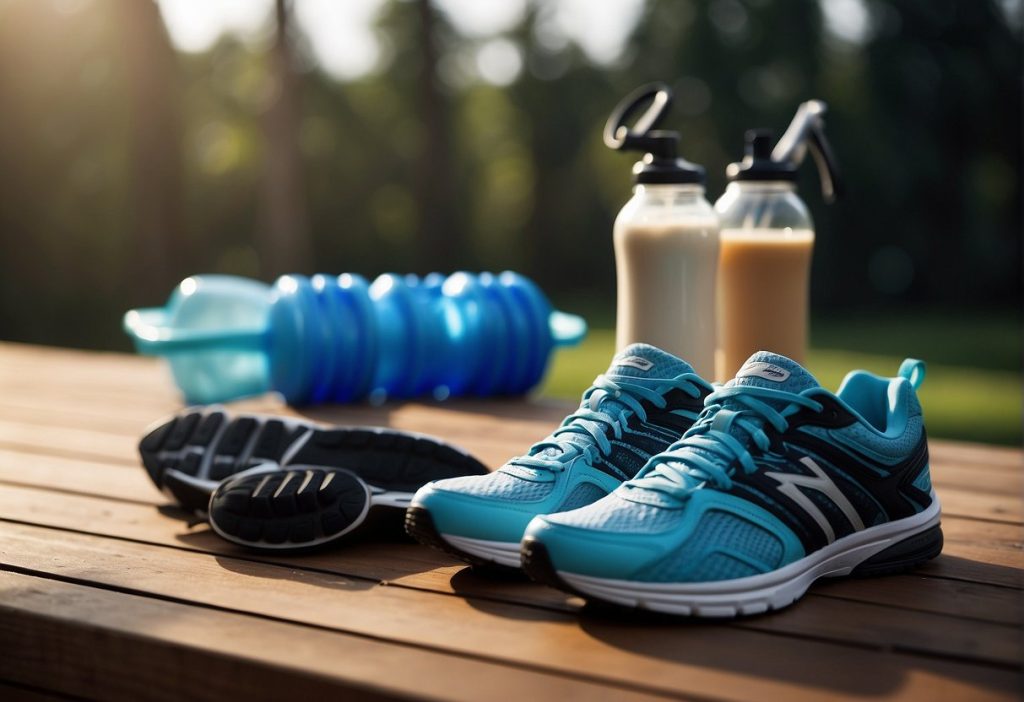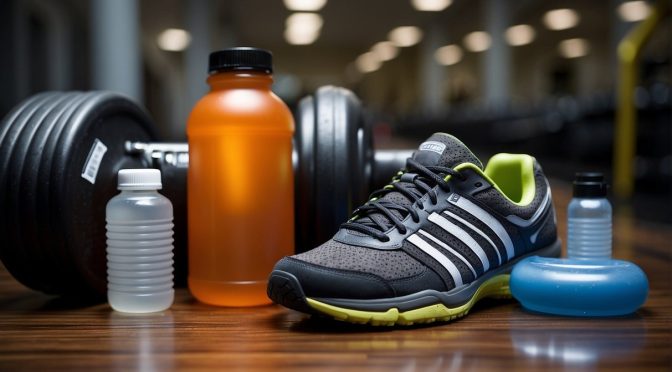For athletes and fitness enthusiasts, muscle recovery is critical. It’s a key part of any training regimen. Your ability to recover from workouts affects your immediate performance. It also influences overall athletic development and long-term health. Scientists understand more about the physiological processes that underpin muscle recovery. They have brought the importance of targeted nutrition to the forefront. Supplements designed to support muscle recovery can replenish what your body loses during exercise. They can help. They can also assist in repairing and building muscle tissue.

Essential amino acids are the building blocks of protein. They include branched-chain amino acids (BCAAs). They are crucial for muscle repair and growth. Your body cannot produce these amino acids. You must obtain them through a well-balanced diet or supplements. Protein also plays a significant role in muscle recovery. It provides the necessary components. They help repair microtears in muscle fibers caused by intense physical activity. Eating the right nutrients after your workout can reduce muscle fatigue and soreness. This can improve your performance in future training sessions.
Post-workout supplements can offer a convenient and effective way to support your body’s recovery process. By understanding the role of amino acids and protein in muscle recovery, you can optimize your recovery. You can also optimize your performance. Incorporating them into your nutritional regime is key.
Key Takeaways
- Proper nutrition enhances muscle recovery, impacting athletic performance.
- Amino acids and protein are fundamental for repairing and building muscles in post-exercise recovery.
- Recovery supplements can be a practical part of your post-workout nutrition strategy.
Importance of Muscle Recovery in Athletic Performance
Muscle recovery is essential to your athletic performance. It allows for muscle growth and repair following intense workouts. Proper recovery ensures you can train consistently. It reduces the risk of injuries from overuse and strain.
During recovery, your muscles rebuild stronger than before. This process is critical for increasing muscle mass and strength. Therefore, incorporating adequate rest is non-negotiable for peak physical performance. Prioritizing sleep is a cornerstone of effective muscle recovery. During deep sleep stages, the body releases critical healing hormones.
Your recovery time will influence how much progress you make in your training. Without sufficient recovery, your muscles cannot fully heal. This can lead to decreased performance and might even hinder muscle growth in the long run. It’s crucial to strike a balance between working out and resting.
Here’s a brief overview:
- Rest Days: Schedule regular days off from intense training to allow muscle repair.
- Sleep: Aim for 7-9 hours of quality sleep per night to facilitate recovery.
- Active Recovery: On rest days, engage in low-intensity exercise. This can be activities like walking or yoga. It promotes circulation and muscle healing.
- Nutrition: Consume a balanced diet with adequate protein to support muscle repair.
By giving your body the time it needs to recover, you’re not only avoiding overtraining. You’re also setting the stage for robust performance gains.
Essential Amino Acids and Branched-Chain Amino Acids (BCAAs)
Your muscles need essential amino acids (EAAs) to recover and grow. They also need a specialized category called branched-chain amino acids (BCAAs). These compounds are fundamental to repairing muscle tissue and promoting muscle synthesis.
Role of Essential Amino Acids in Muscle Recovery
Your body cannot produce essential amino acids on its own and must obtain them through diet. They critically aid in muscle recovery by:
- Protein Synthesis: Stimulating the production of protein in muscles post-exercise.
- Repair and Rebuild: Providing the necessary components to repair damaged muscle fibers and build new tissue.
Benefits of BCAAs for Muscle Growth and Repair
BCAAs, including leucine, isoleucine, and valine, are a sub-group of EAAs. They are particularly important for muscle growth and repair.
- Leucine activates the mTOR pathway directly. This increases protein synthesis and muscle repair.
- Isoleucine and valine support in reducing muscle fatigue and enhancing recovery. They also provide extra glucose to muscles during intense training.
BCAAs Benefits Table
| BCAA | Benefit |
|---|---|
| Leucine | Activates protein synthesis, aids in muscle repair |
| Isoleucine | Reduces muscle fatigue, supports recovery |
| Valine | Provides glucose, assists in muscle metabolism |
Eating these amino acids, especially BCAAs, around your workout can prevent sore muscles. They can also help your muscles recover more efficiently.
Understanding Muscle Fatigue and Soreness
Muscle fatigue and soreness are common experiences after intensive workouts. You may encounter these symptoms as a result of various biological factors and physical stressors. These factors and stressors impact your muscles during and after exercising.
Causes of Muscle Fatigue During Intense Workouts
During intense workouts, muscle fatigue occurs due to the depletion of vital energy sources like glycogen. It also happens because of the build-up of metabolic by-products. One example is lactic acid. This can manifest as a noticeable decline in the muscles’ ability to generate force. For instance, during strenuous activity, creatine phosphate diminishes significantly. This is an energy substrate in your muscles. This contributes to the sensation of muscle fatigue.
- Glycogen depletion: Your muscle glycogen stores will deplete with prolonged or high-intensity exercise.
- Lactic acid buildup: Your body shifts to anaerobic metabolism. This accumulates lactic acid in the muscles. It lowers pH and leads to fatigue.
Exploring the Concept of Exercise-Induced Muscle Damage
Exercise-induced muscle damage (EIMD) refers to the microtrauma that your muscle fibers undergo during high-resistance and eccentric exercises. This process is crucial for muscle adaptation and growth. It is also a primary cause of post-exercise soreness.
- Microtrauma: Tiny tears in muscle fibers due to overstressing.
- Inflammatory response: Your body’s reaction to repair the damage, resulting in soreness.
Muscle Soreness as an Indicator of Effective Workout
Delayed Onset Muscle Soreness (DOMS) is a common indicator of an effective workout. It typically peaks 24-48 hours after exercise. DOMS can be uncomfortable. It’s part of the adaptation process that leads to increased strength and muscle mass.
- DOMS timeline:
- 24 hours: Initial onset of muscle soreness.
- 48-72 hours: Peak soreness when inflammation and muscle repair processes are highly active.
The Role of Protein in Muscle Recovery

Protein is vital for muscle recovery. It serves as a key component in tissue repair and growth after exercise. Understanding how protein facilitates these processes can greatly enhance your recovery. It can also boost muscle strength. Knowing the appropriate intake is also important.
Protein as the Building Blocks for Muscle Tissue Repair
After a workout, your muscles need to repair the microtears that occur during exercise. Protein, comprising amino acids, is essential in this repair process. The amino acids act as the building blocks that your muscles use to repair and rebuild. Eating protein-rich foods or supplements like whey or casein shortly after exercise can jumpstart this repair mechanism.
How Protein Aids in Muscle Strength and Growth
Protein doesn’t just repair muscle tissue; it also promotes muscle strength and growth. When you consume protein, it stimulates the formation of new muscle tissue. Muscle protein synthesis is the name given to this process. This is crucial for increasing muscle mass and enhancing muscle strength over time. Protein powders and supplements contain both whey protein and casein. They are highly effective at initiating this process. This is especially true when consumed after exercising.
Recommended Protein Intake for Optimal Muscle Recovery
Your protein needs depend on several factors. These factors include exercise intensity and personal body composition. A general guideline is to consume between 1.2 to 2.0 grams of protein per kilogram of body weight per day for optimal recovery.
| Type of Protein | Timing |
|---|---|
| Whey (fast-digesting) | Immediately post-workout |
| Casein (slow-digesting) | Before bed |
| Protein-rich foods | Throughout the day |
Distribute protein intake throughout the day. Consider including a protein source in each meal and snack. This ensures a constant supply of amino acids for ongoing muscle repair and growth. Protein supplements can be a convenient way to meet your protein requirements. This is especially true when natural protein-rich foods are not readily available.
Benefits of Post-Workout Muscle Recovery Supplements

Post-workout supplements can significantly enhance your recovery process. They provide key nutrients essential for muscle repair. Understanding these benefits helps make informed choices about your post-exercise regimen.
Enhancing Post-Workout Recovery with Supplements
You experience several benefits when integrating supplements for recovery into your fitness routine. Branched-chain amino acids (BCAAs) are essential compounds. They reduce muscle soreness and improve repair. Your body can’t produce these amino acids. After a workout, it’s crucial to consume them through supplements.
Muscle recovery supplements typically contain glutamine. Glutamine is an amino acid that helps reduce muscle breakdown. It also supports immune system function. This helps you maintain lean muscle mass and overall health during intensive training periods.
Key Nutrients Found in Muscle Recovery Supplements
When selecting the best supplements for recovery, you should look for:
Protein Supplements: Whey protein stands out due to its high biological value and fast absorption rate. It fuels muscle repair. Essential Nutrient Benefit for Recovery Whey Protein Promotes muscle protein synthesis BCAAs Reduces muscle soreness Glutamine Minimizes muscle breakdown.
| Essential Nutrient | Benefit for Recovery |
|---|---|
| Whey Protein | Promotes muscle protein synthesis |
| BCAAs | Reduces muscle soreness |
| Glutamine | Minimizes muscle breakdown |
BCAA’s: These are vital for their role in protein synthesis and muscle repair. You can often find them in powdered or capsule form.
Glutamine: Strenuous exercise can compromise the support of both gut health and immune function.
Choose muscle recovery supplements rich in these nutrients. Doing so supports your body’s ability to recover. You also prepare for the next workout.
Muscle Recovery Supplements: Frequently Asked Questions
Q: What do bodybuilders take for a muscle recovery supplement?
A: Bodybuilders often take a combination of supplements for muscle recovery. These include protein powders, such as whey protein. They also include branched-chain amino acids (BCAAs) and creatine. These supplements can help repair muscles and reduce soreness. They also support overall recovery after intense training sessions.
Q: What post-workout supplement is best for muscle recovery?
A: The best supplement for muscle recovery is protein. You can effectively support muscle repair and growth after a tough workout by consuming a high-quality protein supplement. Examples include whey protein and plant-based protein.
Q: What is the best thing for muscle recovery?
A: Bodybuilders often take a combination of supplements for muscle recovery. These include whey protein, branched-chain amino acids (BCAAs), and creatine. These supplements can aid in muscle repair, reduce soreness, and support overall recovery. Athletes use them after intense training sessions.
Q: Do BCAAs really help with recovery?
A: Yes, studies have shown that BCAAs (branched-chain amino acids) aid in recovery. They reduce muscle soreness and fatigue. They can also support muscle protein synthesis. This is essential for muscle repair and growth after exercise.
Q: What speeds up recovery?
A: Several factors can help speed up recovery after exercise. These include adequate rest and proper nutrition. Proper hydration is also important. Targeted supplementation, such as protein, BCAAs, and creatine, is part of this. Gentle stretching, foam rolling, and low-impact activities can also help muscles recover. In addition, they can.

